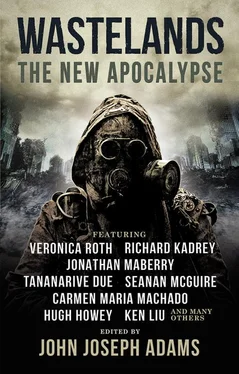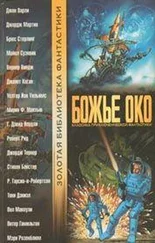She sighed.
“ That is impossible ,” Drobo said, quietly.
“I wish this could be bigger than it is, that it could be about righteousness, or truth. But it’s not.” Kata shook her head. “It’s about where I was, when Erszi was planning this attack. I was in a sylph workshop, and a sylph cybernetics expert was saving my life with the same tech that Erszi was trying to destroy.”
She put her head down on her arms. The Echoes clinked together like a wind chime.
“You have to fight for the ones who fight for you,” Kata said. “And you don’t get to pick who they are.”
* * *
“Erszi,” Kata said to the ghostly image of her sister, standing before the window in the galley.
Erszi turned, and offered a watery smile. She had never been beautiful. Neither had Kata, really. They had the look of people constantly on the verge of argument, like a couple of twittering birds, beaked and fierce. But there was something lively in Erszi’s eyes that appealed, regardless.
“Do you remember when I was twelve, and you told me we would go on an adventure?” Kata said. “You asked your friend, the burly one—”
“Ábel,” Erszi said, nodding. “With the mustache.”
“Yes, him. You asked him to carry me out to the river with you.”
Erszi smiled. “I had blown up that inflatable raft I bought at Polus Mall and dragged it down to Kis-Szamos so we could float under the stars. Only I failed to account for Ábel’s weight—”
“So ten minutes in, we sank, and we had to abandon the raft, and I almost died because I couldn’t move my legs—”
Erszi shook her head. “I almost killed you.”
“Sure,” Kata said. “But you just wanted to give me an adventure.”
“I should have gotten a sturdier raft.”
“It was the best night of my life, I think,” Kata said, and she stood beside her sister’s virtual ghost at the window. “And I’m glad it’s one of the memories you decided to put in your Echo. I wondered if I would make it in there at all.”
“Kata.” Erszi frowned. “There is so much of you in here.”
“Oh, don’t tell me that,” Kata said, wiping tears from her cheeks. “It will make it so much harder.”
“Make what—”
Kata pulled the Echo from its dock and the projection of her sister vanished. She put the Echo in the metal box on the table, along with all the others, stripped of their labels and wiped clean of her fingerprints. She put the lid in place and activated the seal.
Then she bit down on her hand to keep herself quiet as she cried.
The next day, the box would arrive in Maria’s mailbox. Kata could almost see it in her mind: Maria’s deft fingers typing in the security code on the box, the little door popping open to reveal a metal box, half a meter long.
Contained within it would be a row of polished human Echoes, with a note, scribbled on an old piece of newspaper, resting on top.
The note read: send these to your government friend .
* * *
Kata’s ship was in orbit. Glowing large in the windows, lit by the Sun, was Earth, dappled with clouds, patched with land.
From here, she couldn’t see the empty streets of Koloszvar, the curved bars that decorated the windows of her childhood home, the crumbling walls of the old city bolstered by the new. From here, she could pretend that humans still lived on the land beneath her, still drifted on rivers in inflatable boats.
Someday, maybe, they would find a way to go back. Time healed, or so they said, so perhaps it would heal Earth, or some clever scientists would find a way to make it habitable again. Perhaps one day they would fill the silent buildings with voices once again, send the cockroaches scurrying to their hiding places, and Plata Unirii would bustle with people selling embroidered pillowcases and magnets with Dracula’s face on them for the tourists.
But it would never be the same as it had been before. Time did not run backward, much as Kata wished it would. So for the time being, she was content to look down at the planet, now a monument to a particular time, following its winding rivers with her eyes until they disappeared behind clouds.
SHOOTING THE APOCALYPSE
PAOLO BACIGALUPI
Paolo Bacigalupiis the author of the New York Times bestselling novel The Water Knife , a near-future thriller about climate change and drought in the southwestern United States. His novel The Windup Girl won the Hugo, Nebula, Locus, Compton Crook, and John W. Campbell Memorial Awards. Ship Breaker —his first foray into young adult fiction—was a Michael L. Printz Award winner, and a National Book Award finalist, and its sequel, The Drowned Cities , was a Kirkus Best of YA selection, a Voya Perfect Ten Book, and a Los Angeles Times Book Prize finalist. He is also the author of the middle-grade novel Zombie Baseball Beatdown and the YA novel The Doubt Factory . Paolo’s short fiction has appeared in Wired Magazine, High Country News, The Magazine of Fantasy & Science Fiction, Asimov’s , and elsewhere; has been collected in Pump Six and Other Stories ; and has been nominated for three Nebula Awards, four Hugo Awards, and won the Theodore Sturgeon Memorial Award.
If it were for anyone else, he would have just laughed in their faces and told them they were on their own.
The thought nagged at Timo as he drove his beat-up FlexFusion down the rutted service road that ran parallel to the concrete-lined canal of the Central Arizona Project. For any other journo who came down to Phoenix looking for a story, he wouldn’t even think of doing them a favor.
All those big names looking to swoop in like magpies and grab some meaty exclusive and then fly away just as fast, keeping all their page views and hits to themselves… he wouldn’t do it.
Didn’t matter if they were Google/NY Times , Cherry Xu, Facebook Social Now , Deborah Williams, Kindle Post , or Xinhua .
But Lucy? Well, sure. For Lucy, he’d climb into his sweatbox of a car with all his camera gear and drive his skinny brown ass out to North Phoenix and into the hills on a crap tip. He’d drive this way and that, burning gas trying to find a service road, and then bump his way through dirt and ruts, scraping the belly of the Ford the whole way, and he still wouldn’t complain.
Just goes to show you’re a sucker for a girl who wears her jeans tight .
But it wasn’t just that. Lucy was fine, if you liked a girl with white skin and little tits and wide hips, and sometimes Timo would catch himself fantasizing about what it would be like to get with her. But in the end, that wasn’t why he did favors for Lucy. He did it because she was scrappy and wet and she was in over her head—and too hard-assed and proud to admit it.
Girl had grit; Timo could respect that. Even if she came from up north and was so wet that sometimes he laughed out loud at the things she said. The girl didn’t know much about dry desert life, but she had grit.
So when she muttered over her Dos Equis that all the stories had already been done, Timo, in a moment of beery romantic fervor, had sworn to her that it just wasn’t so. He had the eye. He saw things other people didn’t. He could name twenty stories she could still do and make a name for herself.
But when he’d started listing possibilities, Lucy shot them down as fast as he brought them up.
Coyotes running Texans across the border into California?
Sohu already had a nine part series running.
Californians buying Texas hookers for nothing, like Phoenix was goddamn Tijuana?
Google/NY Times and Fox both had big spreads.
Читать дальше


![Nick Cracknell - The Quiet Apocalypse [= Island Zero]](/books/28041/nick-cracknell-the-quiet-apocalypse-island-zero-thumb.webp)









